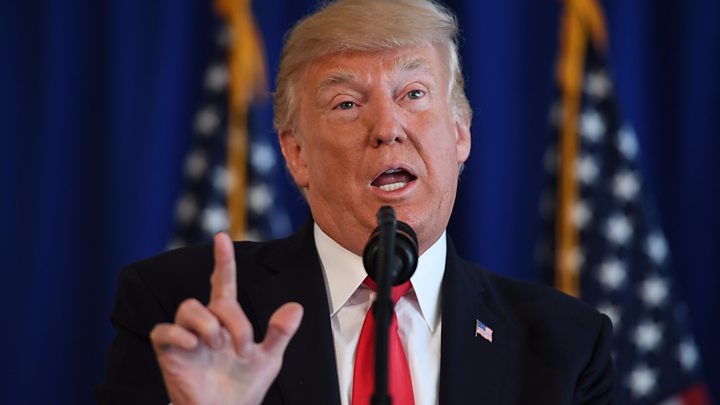The White House has defended President Donald Trump's reaction to deadly violence over a white supremacist rally in Virginia, amid criticism he did not explicitly condemn far-right groups.
But a spokesman said his condemnation included white supremacists.
A woman was killed on Saturday when a car rammed into a crowd protesting against the rally in Charlottesville.
Separately, a rally organiser was chased away by protesters as he tried to give a press conference on Sunday.
Jason Kessler, who organised the controversial "Unite the Right" march, was heckled and booed as he blamed the police for not preventing the violence, which he also condemned.
Nineteen people were injured in the car-ramming incident, and another 15 people were wounded in separate clashes related to the far-right march on Saturday afternoon.
- A reckoning in Charlottesville
- In pictures: Charlottesville protest
- Why Trump's reactions shouldn't surprise us
Protests and vigils in support of Charlottesville were held in many US cities on Sunday. In Seattle, police used pepper spray to stop anti-fascist protesters approaching a pro-Trump rally.
How did Trump initially respond?
Hours after the violence erupted, Mr Trump said he condemned "in the strongest possible terms this egregious display of hatred, bigotry, and violence on many sides".
"The hate and the division must stop right now," he told reporters in New Jersey, where he is on a working holiday. "We have to come together as Americans with love for our nation."
But his comments did not explicitly condemn the white extremist groups involved in the rally, an omission that was strongly criticised by Republicans and Democrats alike.

Many, including senators Marco Rubio and Ted Cruz, echoed the sentiment of Colorado Senator Cory Gardner, who tweeted: "Mr President - we must call evil by its name. These were white supremacists and this was domestic terrorism."
The president's national security adviser, HR McMaster, went further by commenting: "Anytime that you commit an attack against people to incite fear, it meets the definition of terrorism."
Mr Trump's daughter too also appeared to offer stronger condemnation than her father.
In response, the White House issued a statement on Sunday clarifying that Mr Trump's condemnation had included white supremacists.
"The president said very strongly in his statement yesterday that he condemns all forms of violence, bigotry and hatred. Of course that includes white supremacists, KKK, neo-Nazi and all extremist groups," a spokesperson.
Should we be surprised by Trump's response?
Anthony Zurcher, BBC North America reporter
Clues for how the president would react to such a situation were scattered across his presidential campaign.
In February 2016, Mr Trump initially declined to disavow support from the Klu Klux Klan and David Duke, the former Klan leader who became a Louisiana Republican politician.
"Any candidate who cannot immediately condemn a hate group like the KKK does not represent the Republican Party, and will not unite it," Senator Tim Scott of South Carolina, the first black Republican elected from a Southern state since 1881, said.
After a week, Mr Trump gave a firm statement denouncing the KKK, but his initial hesitance would be an issue for the remainder of his presidential race.
If, as Mr Trump's critics suggest, his statements following the Charlottesville incident were yet another "dog whistle" to white supremacists, there's evidence that the message was clearly heard.
"Trump comments were good," one poster on the neo-Nazi website The Daily Stormer wrote. "He didn't attack us. He just said the nation should come together."
How did the violence unfold?
Hundreds of white nationalists converged for Saturday's "Unite the Right" march, called to protest against the removal of a statue of a general who had fought for the pro-slavery Confederacy during the US Civil War.
The far-right demonstrators, who included neo-Nazis and Ku Klux Klan (KKK) members, clashed violently with counter-protesters.
A 32-year-old woman, Heather D Heyer, was later killed when a car was driven into a crowd of dispersing counter-protesters.
Ms Heyer's mother paid tribute to her daughter, who was a civil rights activist and lawyer.
"She always had a very strong sense of right and wrong, she always, even as a child, was very caught up in what she believed to be fair," she told the Huffington Post.
"I'm proud that what she was doing was peaceful, she wasn't there fighting with people."
Twenty-year-old James Fields from Ohio, the alleged driver, is in detention on suspicion of second-degree murder and the FBI has opened a civil rights investigation.
Some observers say that Mr Trump's election to the White House has re-energised the far right across the US.
The Southern Poverty Law Center, a civil rights organisation, says that "Trump's run for office electrified the radical right, which saw in him a champion of the idea that America is fundamentally a white man's country."
- Are right-wing groups on the rise?
- America's alt-right movement
- Why do people still fly the Confederate flag?





No comments:
Post a Comment